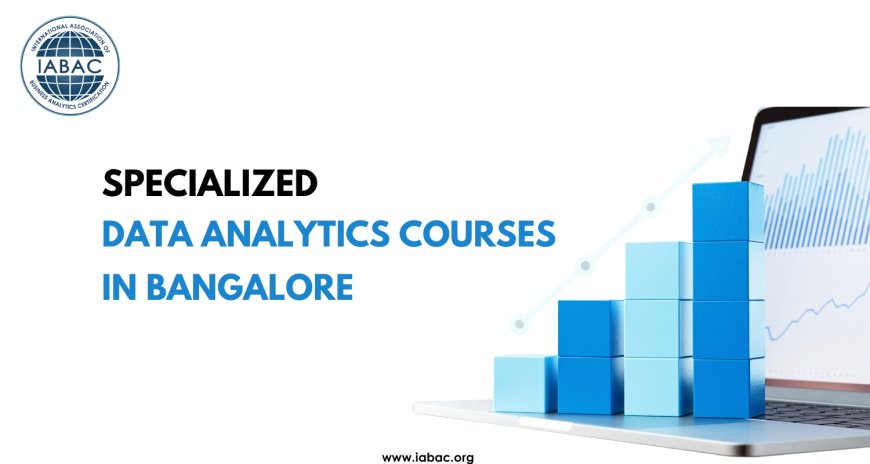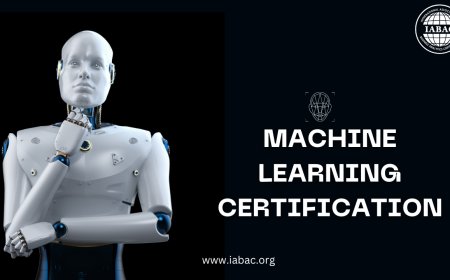Specialized Data Analytics Courses in Bangalore
Boost your career with Data Analytics Courses in Bangalore. Learn advanced skills to excel in the data industry.

Many specialized courses are available here to meet this demand. These courses not only teach technical skills but also give insights into the industry and practical experience. The Data Analytics Courses in Bangalore cover a wide range of topics, from basic statistics to advanced machine learning. They teach how to work with data, visualize it, and understand it, which helps in making smart decisions. Whether you're new to this field or already working, there's something for everyone in Bangalore's educational offerings.
Data Science Courses in India have become popular lately. They not only cover data analytics basics but also dive into artificial intelligence and big data. With real-world projects, they make sure students can apply what they learn in the industry. Getting certifications like Data Science Certificate or Business Analytics Certification adds value to your skills. These certifications show you're good at analyzing data, which is valuable in the job market. Similarly, Artificial Intelligence Certification is great for those interested in AI and machine learning.
Bangalore's Data Analytics Scene offers plenty of opportunities for a fulfilling career. Whether you want to be a data scientist, business analyst, or AI expert, the courses here can help you achieve your goals. With a mix of theory, practice, and industry exposure, these courses prepare you for a bright future in data analytics.
Exploring Bangalore's Booming Data Analytics Scene
The city is like the tech capital of India, so it's no surprise that data analytics is booming here. There are so many courses you can take to learn about data analytics. They cover everything from the basics to more advanced stuff for managers. These courses help you learn how to understand and use data to make smart decisions.
If you want to show that you're really good at data analytics, you can get certified. Certifications like Certified Data Analyst and Certified Finance Analytics Professional show that you know your stuff. Bangalore is perfect for anyone who wants to get into data analytics. The city has great infrastructure and a big community of tech lovers. It's the ideal place to learn and grow in this field. Bangalore's data analytics scene shows that it's not just a tech hub but also a place full of opportunities for people who want cool careers in data analytics.
The Confusion of Choosing Data Analytics Courses in Bangalore
In Bangalore's bustling world of data analytics, picking the right tools can feel like finding your way through a maze. There are so many options out there, from software to programming languages, that it's hard to know which one is best. And each choice has its good points and bad points, making the decision even tougher. The problem gets even trickier because things in this field change fast. What's cool today might be old news tomorrow, so you always have to keep up.
With all this going on, it's important to be careful and think ahead. You have to think about things like how well a tool will work as your needs grow, whether it'll work with what you already have, and if it'll still be useful in the long run. Talking to other people, doing some research, and getting advice from experts can all help you make smart choices that fit with what your company wants to do. So, when you're trying to pick the right tools for your data analytics work in Bangalore, take your time. There's a lot to think about, but with some help and careful thought, you can find the tools that'll help you do your best work.
How long is the data analyst course in Bangalore?
1. If you're eyeing a Data Analytics Course in Bangalore, you're looking at something that'll take you anywhere from 3 to 6 months. But hey, the length can vary depending on where you're studying and how deep they dive into the stuff.
2. Picture this: most data analyst courses in Bangalore are gonna run you about 4 to 5 months. During that time, you'll get to grips with things like crunching numbers, making sense of data, and even dipping your toes into machine learning.
3. Now, here's the kicker: some places offer these turbocharged courses. We're talking about squeezing all that learning into a shorter span, like around 3 months. It's for those folks who want to dive in headfirst and come out the other end as a data wizard.
4. But hold your horses, because the duration isn't set in stone. It can change based on whether you're studying full-time or squeezing it in around other stuff, like work. Plus, each course might have its own set of requirements and schedules to juggle.
5. Before you go signing up for anything, it's smart to do a bit of homework. Check out different institutes, see what they're offering, and compare. Look into things like who's teaching, what they're teaching, and if they've got any connections in the industry. It'll help you make a better call in the long run.
Cracking the Code to Data Analytics Success in Bangalore
Bangalore, known as India's Silicon Valley, is a busy place full of tech and innovation. Lots of smart people work here, and data analytics is super important for making smart business decisions. If you want to be great at data analytics in Bangalore, here's how you can start.
1. Learn the Basics
Before you do anything fancy, make sure you understand the basics. Learn about numbers, cleaning up data, and showing data in graphs. You can find beginner courses online to help you with this stuff.
2. Take Classes
To get good at data analytics, take classes that focus on it. In Bangalore, there are lots of courses for different skill levels. Check out places like IABAC for training that covers everything from beginner stuff to advanced things like machine learning.
3. Practice with Real Projects
Just reading isn't enough. You gotta practice what you learn. Websites like Kaggle have data you can play with, and there are also local events where you can work on real projects and meet other people in the field.
4. Keep Up with What's New
Data stuff is always changing, so stay updated. Learn about new tools and trends by reading blogs, subscribing to newsletters, and joining online groups. Tools like Python, R, and SQL are really important to know.
5. Show Off Your Work
Make a portfolio that shows the cool stuff you've done with data. Having lots of different projects to show off can help you stand out when you're looking for a job.
6. Find Someone to Help You
Having a mentor can be really helpful when you're trying to learn something new. Joining groups like IABAC can help you meet people who can give you advice and support.
7. Work on Your Communication Skills
Being good with data is important, but so is being able to explain what it means. Practice talking about your findings in a way that's easy for other people to understand.
Tips for Doing Well:
- Keep Learning: The data world is always changing, so keep learning new things.
- Meet People: Going to events and meeting other people who like data can help you learn and find job opportunities.
- Stay Curious: Always ask questions and look for interesting things in data. Being curious helps you find cool stuff!
Getting good at data analytics in Bangalore might be tough, but it's worth it. Follow these steps and use all the resources available to you, and you'll be on your way to success! If you want more info about courses and stuff,
Bangalore has a lot of different Data Analytics Courses in Bangalore. These courses are made to help people with different career goals. They cover a wide range of topics like machine learning, AI, data visualization, and predictive analytics. The goal is to give professionals the skills they need to work in today's industries that rely on data. Whether you're looking for advanced training or just starting, Bangalore has courses that can help you get better at data analysis and succeed in the competitive global job market.











































